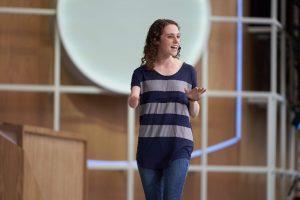Tal

Hi! I’m Tal. I grew up in the Bay Area and with Shriners Hospitals for Children – Northern California and after a brief stint on the east coast, happily came running back to foggy San Francisco. Today, I work as a Product Manager at Google. When I’m not traveling or spending time with friends, I love to dance, build things, or learn something new (most recently, I’ve been happily falling down a mountain as I try to learn to snowboard!)
What is your experience of having a congenital hand difference?
I consider having a hand difference to be a part of who I am, but by no means the entirety of who I am! While it can sometimes take some work to help other people realize this, for the most part I’ve found that if I’m just myself, people tend to figure it out pretty quickly.
What is something that makes you proud and/or something you like about having a congenital hand difference?
I love solving problems. Growing up with a hand difference meant I was always getting to figure out how to do things myself – a nice puzzle to figure out! When I was younger, I got to work with my parents and siblings to figure out how to do something myself (like how to put a bracelet on my left wrist without having a right hand). Later in life, this same love for problem solving helped me in school and work. (Plus, the 50% off on manicures is pretty great!)
How have you adapted to activities? (Share specific examples if possible)
I have various adaptations for different activities, but most of them aren’t things I even think about, they’re just naturally how I’d do something. I use prostheses for certain activities, whether it’s a myoelectric to ride a bike, a passive sports arm to exercise, dance or make it easier to get up when I fall down a mountain learning to snowboard, or my mechanical hook when I’m working in the woodshop.
What are things you did not expect in having a congenital hand difference? How did you manage these unexpected things?
There are always little things that can pop up – new activities you didn’t expect to be as challenging as they are, new situations or people to interact with – but the overall need to adapt to activities and people quickly becomes just a part of life!
What would you like new parents of children and other children/ teens/ adults with congenital hand differences to know?
Growing up, it was never a matter of if I could do something, but rather a question of figuring out how I could do it. I loved this approach and still enjoy it today.
